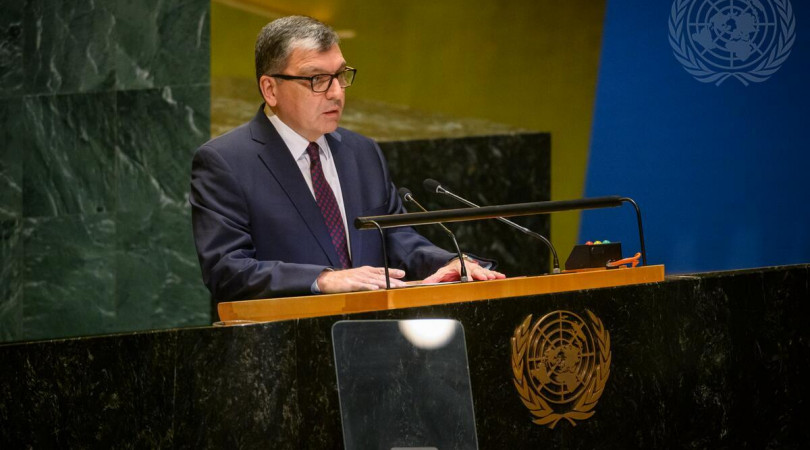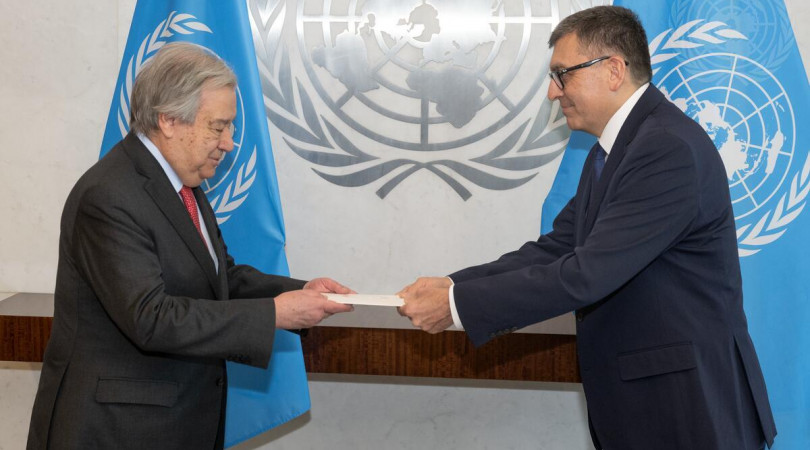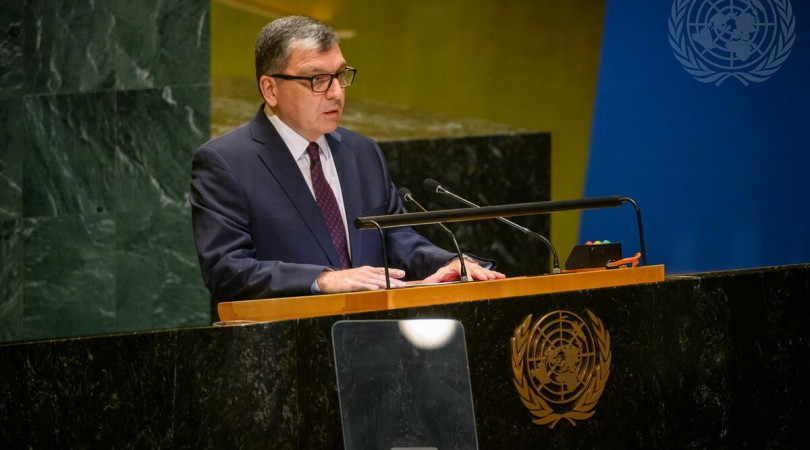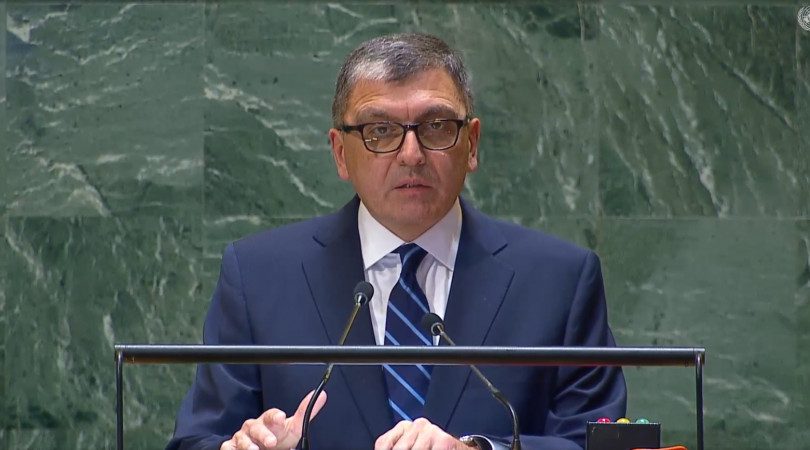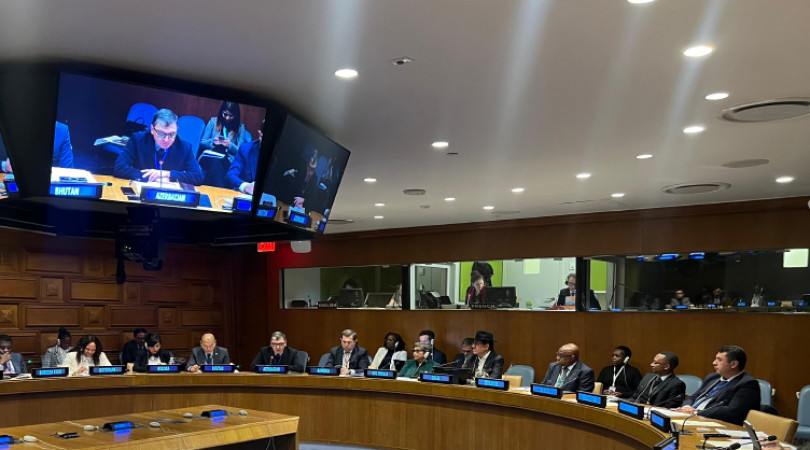Ilham Aliyev attended the opening ceremony of the 5th World Forum on Intercultural Dialogue
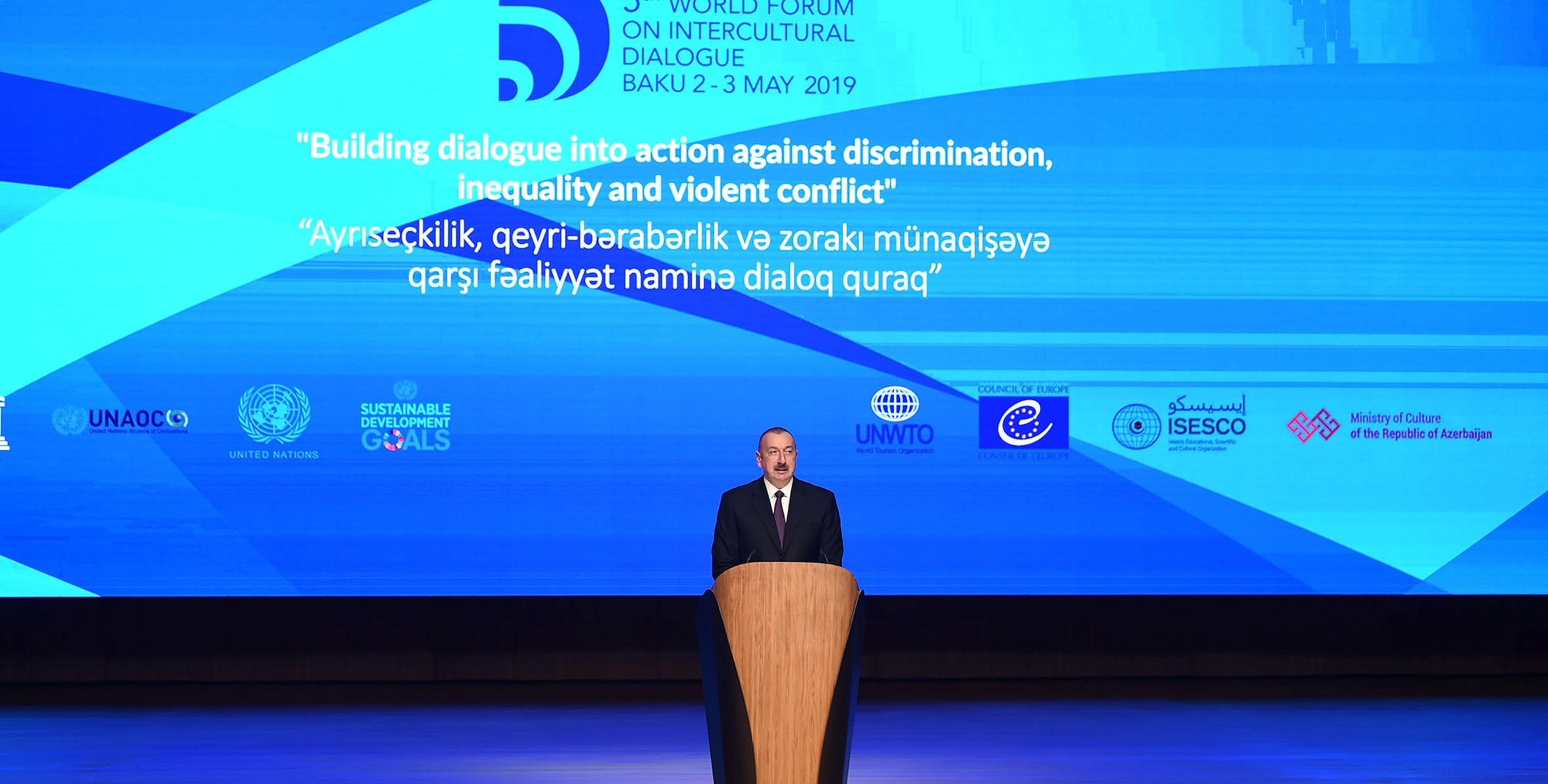
President of the Republic of Azerbaijan Ilham Aliyev and first lady Mehriban Aliyeva have attended the opening ceremony of the 5th World Forum on Intercultural Dialogue under the motto "Building dialogue into action against discrimination, inequality and violent conflict” at the Heydar Aliyev Center.
The head of state made a speech at the opening ceremony.
Dear ladies and gentlemen,
Dear guests,
First of all I would like to great all the participants of the forum and express my gratitude to our guests for being with us today. We have guests from more than 100 countries, more than 500 foreign representatives participate in the forum. This shows that the forum in a relatively short period of time transformed into a global platform to address one of the most important issues of today's agenda, issues of cultural dialogue. I remember eight years ago, when we held the first forum probably we did not even imagine that the forum will get such a broad international support. Our initiative to organize world forum on intercultural dialogue in 2011, was based on our history, our geography, and our understanding that in order to make world safer we need to be very active on the issues of promotion dialogue between civilizations, between cultures, between representatives of different religions and ethnic groups. And broad international support which was shown to the forum encourages us. Today among organizers of the forum we have leading organizations of the world, and our joint efforts, joint activity contributes to the cause of intercultural dialogue. Azerbaijan is a place where, for centuries, representatives of different religions, ethnic groups have lived, created, communicated. For centuries Azerbaijan has been the land of religious tolerance, peaceful coexistence of representatives of different nationalities. Our history, our geography shows that only in the spirit of partnership, in the spirit of mutual respect we can achieve success. Today Azerbaijan's rapid development is also based on this cultural heritage, also is driven by the solidarity which all the representatives of our society demonstrate. We are proud of our history, we are proud of our historical monuments which also demonstrate that for centuries representatives of different religions have lived and created in Azerbaijan. We are proud of our ancient history. One of the oldest mosques in the world is situated in the ancient city of Shamakhi. One of the oldest churches in the Caucasus, the church of Caucasian Albania, is situated in our ancient city of Shaki. Our history is the history of cultural diversity and today based on that historical heritage Azerbaijan demonstrates to the world that intercultural dialogue is the only way how to bring countries closer, how to establish more bridges between representatives of different religions and civilizations. Multiculturalism for us is the way how we live. This is a relatively new word but we have lived in this atmosphere for centuries. And the fact that 2016 was declared the year of multiculturalism in Azerbaijan demonstrates that we want to attract attention of the world to this important idea. 2017 was announced the year of Islamic Solidarity. That was also a symbolic step, demonstrating our historical heritage, our roots, and our openness to the world. And I think these tendencies, if they prevail, prevail globally will make our world safer, more predictable, and more peaceful. Multiculturalism for us also is one of the important elements of our policy and the international center of multiculturalism was created in Azerbaijan, and we are promoting these values, we are demonstrating that multiculturalism has a great future. We all know that there are different views regarding this issue. But I think our forum and numerous international events organized in Azerbaijan and different parts of the world with this agenda clearly shows that we are all trying to promote the values of multiculturalism. World forum on international dialogue, is one of the important international events globally, and of course for our country, but at the same time Azerbaijan during the last years hosted numerous international events, such as World Religious Leaders' Forum, traditional Baku Humanitarian Forum, seven times we organized Baku Global Forum, which is also a very important platform to address the issues of political development and cultural dialogue. That forum is organized by Nizami Ganjavi International Center and many other important international events. Thus, we are trying to attract attention of the world community to these important issues. I am sure that the discussions at the forum today and tomorrow will not only reveal the problems and allow the speakers to express their views but will also contribute to strengthening the partnership, solidarity, cooperation and as a result will build more bridges between cultures. Last year, we celebrated the tenth anniversary of Baku Process. This is also an initiative that we are proud of. I remember when we launched this initiative in 2008, it immediately got very positive international approach and attention. That was for the first time, when Azerbaijan brought together ministers of cultures of member states of the Council of Europe, and member states of the Organization of Islamic Cooperation, and more than hundred countries got together in Baku, in order to discuss the prospects for cooperation. We organized another session with participation of above mentioned ministers in 2009. And this initiative was named Baku process, and today Baku process is one of the most important instruments of dialogue between Europe and the Muslim World. Azerbaijan as one of the few countries which is the member of the Organization of Islamic Cooperation and European institutions is playing its natural and I am sure, positive role in establishment of contacts in providing opportunities for dialogue-dialogue what we need. We need dialogue in issues related to culture, in issues related to inter-religious relations. We need dialogue on all the issues. Political agenda, on economic cooperation, on issues related to security, and the name of the forum is dialogue. So, that is what we present to the world and that's what gets very broad international support. So, Baku process today is an initiative which is supported by United Nations, by other leading international organizations and of course, I am sure that Baku process has a great future. The forums like this attracts attention of international community to the issues of cultural dialogue. It elaborates new ideas, new approaches and for those, who make decisions in different countries and international organizations, I think this is a very good and positive platform to make right decisions. Azerbaijan in this respect, inside the country and outside, conducts the policy which is based on mutual understanding, on cooperation, we are building bridges. We are situated between Europe and Asia, and our geography of course, influenced our history, and is influencing our today's development.
Today Azerbaijan as a relatively new independent country plays an important role in building bridges between Europe and Asia. Political, economic, cultural and bridges from practical point of view, connectivity, transportation. Last year we celebrated the 27th anniversary of our independence and during this period of time Azerbaijan transformed into a modern, developing country with modern infrastructure and with a very clear vision for the future. One of the main problems we are facing for many years is the Armenian occupation. For more than 25 years Armenia continues to occupy our historical land Nagorno-Karabakh, and seven other districts of Azerbaijan. This is brutal violation of international law. Our people were subject of ethnic cleansing, more than one million refugees became homeless as a result of Armenian aggression and occupation. The OSCE twice sent a fact-finding mission to occupied territories and their report clearly show that all our historical heritage, all our historical religious monuments are destroyed. United Nations Security Council adopted 4 resolutions demanding immediate and unconditional withdrawal of Armenian troops from our territories and these resolutions remain on paper. So this is one of the indicators that sometimes resolutions of the Security Council are not implemented for so many years and there is no mechanism of implementation or if there is a mechanism it is not applied and thus Azerbaijani lands are still under occupation. Numerous international organizations like the Organization of Islamic Cooperation, Non-Alligned Movement, OSCE, Council of Europe and other adopted similar decisions and resolutions with respect to territorial integrity of Azerbaijan. Territorial integrity of Azerbaijan is recognized by the whole world and must be restored and the conflict must be resolved based on international law norms, relative UN Security Council resolutions, the UN Charter, Helsinki Final Act and territorial integrity of Azerbaijan. Despite this huge problem and humanitarian catastrophe, Azerbaijan managed to transform into a modern country with very active foreign policy with economic policy which allowed us to improve largely the living standards of our people. On foreign policy track Azerbaijan is a reliable partner to many countries. We area active member of Islamic Cooperation Organization, we have very close ties with European Union and with nine members of EU Azerbaijan adopted documents on strategic partnership. As I said Baku Process is our contribution to establishing bridges between Europe and the Muslim world. In other words, our foreign policy agenda is based on cooperation, on strengthening partnership and on mutual benefits. And our foreign policy allows us to implement very important international energy transportation projects because without good cooperation, with partners, with different countries it is not possible to implement these projects. Our economic development during the last period of time was also supported by our energy projects. And together with our neighbors and with our partners we managed to connect the Caspian Sea with Black Sea, Caspian Sea with Mediterranean Sea by diversified network of pipelines thus providing energy security for us, for our neighbors and for many countries in the world. And today when we are actively working on the implementation of the Southern Gas Corridor this is a new scale of the project. This project already makes it possible for seven countries to get together and to take benefit and advantage of this. Our economic development during the last 15 years was the fastest in the world. We implement very important reforms which allow us to improve largely the business climate in our country, to attract investments. And according to the World Bank’s latest assessment Azerbaijan is number 25 with respect to Doing Business Programme of the World Bank and business climate is very friendly to foreign investments. We are working now on the strategy of reducing our foreign debt which is low-it is about 19 percent of GDP. And at the same time, we are working on issues related to diversification of our economy and eradication of unemployment and poverty. That was one of the main topic on our agenda because our economic development is transformed into the increase in living standards of our people. Fifteen years ago, around 50 percent of our population live below the poverty line, now this figure went down to about 5 to 6 percent. And poverty, unemployment, social inequality, illiteracy-they are one of the sources of radicalism, extremism. Azerbaijan is a very active partner in the fight against international terrorism, radicalism, extremism. At the same time, we promote to the world the values of Islamic civilizations, we organize numerous exhibitions, presentations, cultural events in different parts of the world to demonstrate our culture and to demonstrate the culture of our partners in other Muslim countries.
Talking about the connectivity, I would like to mention the projects which Azerbaijan participates in, particularly the transportation projects. We look at these projects not only from the point of view of transportation connectivity, these projects actually change the atmosphere in the region. They create the broad format for international cooperation. Azerbaijan is situated on the ancient Silk Road and modern infrastructure which we created recently has already transformed Azerbaijan into an important transit country. And without close cooperation with our immediate neighbors and other partners it is not possible to become a transit country. You need neighbors, you need partners. Therefore, investments in transportation automatically lead to a more predictable situation in the region where the countries share the benefit. Our policy is to achieve our goals, to make country stronger through cooperation, through mutual understating and through shared benefits. In our policy related to energy security we are always trying to find a proper balance between producers, transit countries, and consumers. Because there should be a win-win situation. Otherwise it will not work.
And we always must be ready to extend support to our partners when they need it and of course if we need this support we also expect the same from our partners.
Azerbaijan is also an active participant of the North-South transportation network. Thus, if you look at the map you will see that from north to south, from east to west the transportation lines cross our country. But in order to do that we had to work hard. Geography is not enough, geography is only a prerequisite, a basic element but we invested largely in transportation infrastructure, sea ports, railroads, airports, highways so that today Azerbaijan from geographical point of view and point of view of transportation hub can provide a lot of opportunities for our partners.
Dear friends, today’s Forum is a remarkable event here in Azerbaijan. I once again like to express gratitude to all our partners, partner organizations, intellectuals, politicians, public figures, representatives of NGOs, representatives of media, scientists who participate at the Forum. I am sure that the discussions will be very productive and as a result of discussions the recommendations will be provided. And I am sure that those who make decisions about the future of their countries or regional development will take into account our recommendations and the world will be more stable, secure and safe. Thank you very much.
The event then featured the screening of a video highlighting the history of civilizations, ongoing conflicts and acts of terrorism across the world, and the atmosphere of tolerance in Azerbaijan.
Other speakers at the event included High Representative of the United Nations Alliance of Civilizations Miguel Ángel Moratinos, Assistant Director-General for Social and Human Sciences at UNESCO Nada Al-Nashif, Secretary General of the Organization of Islamic Cooperation (OIC) Yousef Bin Ahmad Al-Othaimeen, Deputy Secretary General of the Council of Europe Gabriella Battaini-Dragoni, and Director General of the Islamic Educational, Scientific and Cultural Organization (ISESCO) Abdulaziz Othman Altwaijri.
The forum is organized by the Azerbaijani government in partnership with UNESCO, the UN Alliance of Civilizations, the UN World Tourism Organization (WTO), the Council of Europe, and the Islamic Educational, Scientific and Cultural Organization (ISESCO).
High-ranking officials from more than 100 countries and 30 international organizations attend the event.
© President.az

